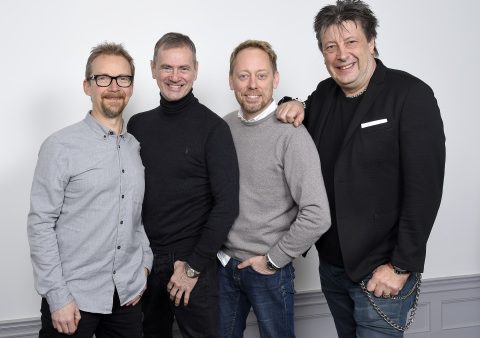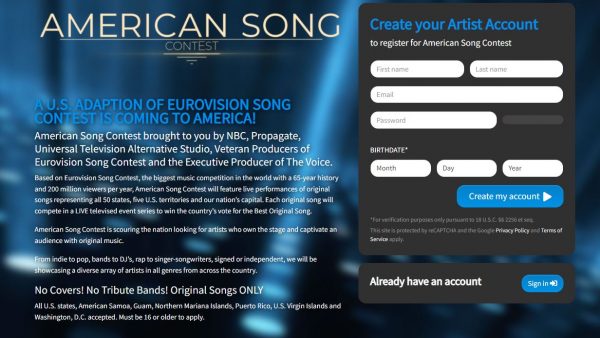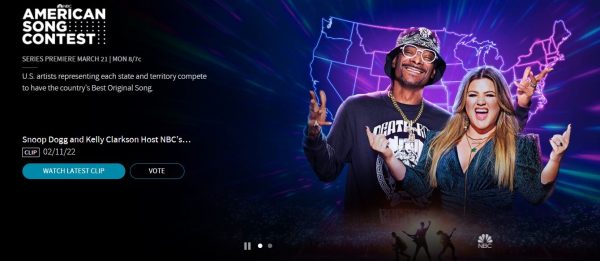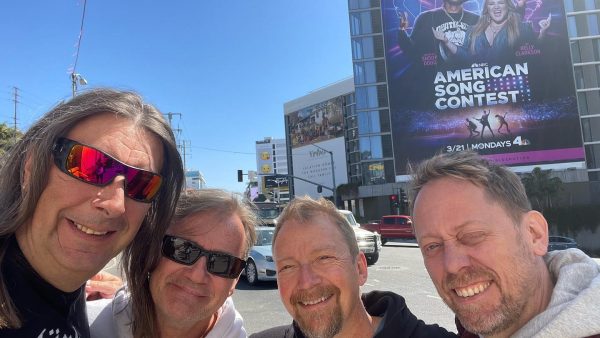How Did We Get Here?
During the Eurovision Song Contest 2019, it was announced at an EBU press conference that an American version of Eurovision would be further developed for broadcast with ex-Melodifestivalen head Christer Björkman, stage production guru Ola Melzig, as well Anders Lenhoff and Peter Settman (Brain Academy, and previous producers of Melodifestivalen) at the helm.

Team Sweden – American Song Contest Inc (Source: Business Wire)
Over the course of that year, more than 10 large broadcasters in the United States expressed interest, but eventually the rights went exclusively to heavyweight NBC. This partnership with NBC also led to the further onboarding of Executive Producers for The Voice, namely Audrey Morrissey, Ben Silverman and Kyra Thompson.
What To Expect In The Show?
One of the most important things to note, from a Eurovision fanatic perspective, is that this is not the same contest. Clearly, changes have had to made to fit the size, the circumstances, and of course the viewer market that the show lies in. You will not see thousands of people in an arena waving flags, there are no televised selection processes for who will represent, and – take a deep breath – you are not going to have a 4-hour spectacular with people appearing on screen from across the nation to deliver scores.
What the format does hold faithful to is that the focus is on the songs – which must be original, the delivery of the performance will be visually spectacular, it will showcase a diversity of artists both in genre and personal background, and that it is about creating an environment to encourage people to come together under the umbrella of music.
How the show is delivered is less Eurovision Song Contest, more Sweden’s Melodifestivalen.
Over the course of eight weeks, it will have five quarterfinals, two semifinals and the final, each with 10-12 artist performances over the course of a 2-hour show on Monday nights – a traditional and well-established reality TV timeslot for NBC’s The Voice.
Allowing two hours to deliver roughly 11 artists per week means a quick pace will be set in the show that still allows for some space for potential storytelling. This is something that is seen in other US reality show formats and puts its combination of legacy musicians and emerging artists on a much more level playing field.
On top of this, the main role of the hosts – Kelly Clarkson and Snoop Dogg – will be to communicate the difference in voting for the best song compared to artists like The Voice, and how the votes are tallied based on a state-based voting system. The most popular artist by sheer vote numbers doesn’t win here, it’s the song that gains the most support across the whole of the country that will be the victor – just like Eurovision.
https://www.tiktok.com/foryou?is_from_webapp=v1&item_id=7073997852795538730#/@jaxwritessongs/video/7073997852795538730
The state-based support concept is fairly new to world of reality TV in the US but can rely upon the same mechanisms of fan support that are built into national sports like college football. This friendly rivalry is also a large part of the social media plan for the Contest, with Tiktok already hosting a viral post encouraging both the artists and their fans to tell us why their home state is the best.
The shows will take place live in the Los Angeles Universal Studio backlots, at the sound stage that previously was used by The Voice. This does mean that the stage itself will not be on a scale one has come to expect at Eurovision, but given the background of the production behind it, they will utilize the space to make it look much larger than you would typically see in a reality tv music show, with unique styling aspects to differentiate every act on stage. There will also be a limited audience, with tickets available for free through 1iota.com
All of these creative changes make perfect sense given the experience of people like Christer Bjorkman behind it, as well as allowing for American audiences to quickly understand the concepts and gain their buy-in as viewers through some touch points of familiarity.
How Were The Songs and Artists Selected?
For this first year, an internal selection process was utilised with a very exhaustive submission process and also the support of Atlantic Records. It is hoped, with its possible success, that the Contest can look to holding state-based selection processes, much like national finals, in the future.
This style of internal selection process is not a new concept, drawing upon the experiences of Melodifestivalen in how it determines its lineup, but also countries such as Australia at Eurovision. Essentially some songs are submitted directly with artists attached through the Song Portal (which closed on 31st July 2021), others would have arrived as demos and then are matched to artists. For those artists submitting their own songs directly, they had to submit one song only; it could not be a previously commercially released track and if it had been shared through any social channel, all versions of the song had to be removed before being considered.

American Song Contest Portal screenshot
Artists were also identified utilising a vast network of A&R scouts, managers, booking agent contact lists gathered from some of the production teams’ time spent on creating The Voice.
As part of the rules, all artists have to be citizens or residents of the United States and/or competing territories, however the co-writers of the songs can be from overseas. The artists represent all 50 US States, as well as Washington DC, and the territories of Guam, American Samoa, US Virgin Islands, Northern Mariana Islands and Puerto Rico.
The process of selection in the first round was to submit the song and a performance video with the maximum length of the submission capped at five minutes (not the Eurovision traditional three minutes). These were then assessed by an internal jury to determine the final list.
Skimming through the entry list now, it’s clear that these are not your usual reality music TV contestants; the overwhelming majority of the acts identify as emerging talents having performed on on live stages for 3+ years, have management and development deals and usually a minimum of one EP release already available.
As showrunner of ASC Audrey Morrissey says about them,
“This is a professional platform. This is for the Artists, the person who is committed to, “This is what I’m doing in my life, and I’ve been grinding it and working it on the road for years. I’m kind of a known entity. A&R scouts know about me. Maybe I am about to be signed, or I already have been signed, or I’ve turned down deals because I want to go it alone.”
How Will Voting Be Done?
The public voting will be conducted from the start of each broadcast through the mechanisms of the existing NBC app, Song Contest website and the Artists Tik Tok. A maximum of 10tenvotes per artist can be made per voter.

American Song Contest website (Source: NBC)
- 5 Quarterfinals (21 & 28 Mar, 4/11/18 Apr) – 11/12 acts each – four from each show going through to semi finals.
- 2 semifinals (25 Apr & 2 May) – 11 acts each – five from each show will go through to final.
1 Final (9 May) – 10 acts, 1 winner.
For the quarter finals, once reaching the conclusion of the performances, a 56-member jury of music professionals representing all the states and territories will select 1 act to go directly through to the next round. The public will then vote and choose the remaining three artists to move forward to the semi finals. The voting lines will remain open until Wednesday, and the decision of the public will be announced on the following week’s show.
The public vote results will be determined through state-isolated ranked voting, following the methodology of awarding the most voted artist 12 points, 2nd artist 10 points, and so on, which are then combined across the territories for a total score.
At the semi final stages, the originally selected 20 artists will perform over 2 shows, as well as 2 “wildcard” artists who will selected by the jury for a second chance. The calculation of the semi final then moves even closer to the modern Eurovision scoring model with 50% jury and 50% televote. Once again, the voting lines for the public will remain open beyond the show until the following day, and results announced the following week.
Only the final show will deliver live voting results.
How Successful Will This Be?
A lot is riding on the format’s launch. For NBC, this is the biggest TV show launch in 11 years in terms of investment. The pre-show investment included cross promotion during the Superbowl, a large scale rollout of country-wide visual advertising, heavy investment on social media (in particular on Tik Tok) and also sponsorship of events currently at the Austin Texas-based showcase festival SXSW.

Sunset Boulevard Billboard (Source: Ola Melzig)
Obviously, rating numbers will count and it will be important to sustain or grow whatever numbers tune in for the first episode. NBC being a commercial station survives on the advertising revenue and it will want to encourage big name sponsors to be part of the whole 8-week journey.
The true measure of long-term success though will lie in the post-contest streaming numbers on Spotify and Apple Music, with fans able to pre-save links for the entries. All competing artists should benefit from the exposure, leading to more buy-in from the record labels and management teams and encouraging future artists to compete.
On the other end, there is an increasing amount of highly experienced production talent joining ‘American Song Contest Inc’ to sell both the show for broadcast in other international markets and an expansion of the format into territories not already part of Eurovision or this Contest.
Clearly, the confidence in its success is already there.
Why Do We Care?
The Eurovision Song Contest has its own traditions that have taken over 60 years to develop, and even now, has to introduce changes to move with the times and the market demands. The American Song Contest, because Eurovision is a relatively unknown entity in the United States (beyond the big names it has produced in the past and *that* Will Ferrell film) has the chance to create something new and exciting that rings true for them.
Nevertheless a lot of what we as fandom love and embrace is still very much an important part of the show.
If you enjoy the spectacle, no doubt America can produce it in spades, with the slick camerawork, showcasing new technologies, the costumes, the lights and quite possibly, the glitter of our original favourite contest. We will keep tuning in like the curious Contest addicts that we are because every episode will be a surprise, with songs only unveiled to the public when the show goes to air – just like Melodifestivalen. And because of the selection of artists and the people behind the production, we know a certain quality level will be on display.
Most of the songs and the performances will be authentic to the artists, which is always a good thing. We will see them as they want to be portrayed, not how they are shaped by a mentor, like on other music talent shows.
The American Song Contest will showcase not only pop, rock and country, but also RnB, hip hop, Latino, rockabilly, soul, funk and folk on a level we simply don’t see on display in it’s European-based counterpart. Over the next eight weeks, we will hear mariachi bands, we will witness k-pop acts through an American filter, we will see people of different nationalities and hear different languages on the stage. Not every song will be everyone’s cup of tea, but no doubt we will find something to fall in love with, and we will have a whole new set of artists to follow post-show.
But utmost of all, just like Eurovision, this will demonstrate that the world is a melting pot, and music has the ability to transcend boundaries and bring people together – from both the artists to the audience. And we are, as fans, now able to expand that family just a little bit more.
@ni.co_official for legal reason, new jersey made a full recovery 🤭 be sure to watch @brookealexx @grantknoche (luv y’all ❤️) + us on @americansongcontest april 4th!!! #americansongcontest #itstrickychallenge
Where Can You Watch?
United States: Live on NBC at 8pm Eastern every Monday starting 21st March. Also available next day on demand via NBC.com, Peacock and Hulu.
Outside of USA (check your TV listings for exact times):
- Austria – Servus TV
- Canada – CHCH-DT
- Finland – YLE TV2
- Greece – ERT
- Iceland – RUV
- Norway – NRK
- Portugal – RTP
- Serbia – RTS
- Spain – RTVE Play
- Sweden – SVT
Stay tuned as over the next 8 weeks, as Sharleen Wright and ESC Insight will preview the each of the shows’ artists, as well as discuss emerging themes in-depth, interview some of the competitors and bring us a live on-ground perspective in April.










Excellent preview, Sharleen. Is there any way we will be able to watch (on repeat) from here in the UK?
Hi Eurojock – whilst the UK has Peacock available through Sky, I don’t believe the rights have been struck to stream it through there just yet. You need to “get creative” and watch it via one of the other channels in the meantime.
Thanks Sharleen. I checked out SVT Play – but it looks as if the show is Geoblocked in the UK.
I’ve just listened to the recently released audio versions of all the Heat 1 songs on Youtube and in my opinion there’s not a dud among them. As I suspected, the Americans are taking this seriously. My personal favourites on first listen were Yam Haus – Ready to Go and UG Skywalkin – Love In My City.